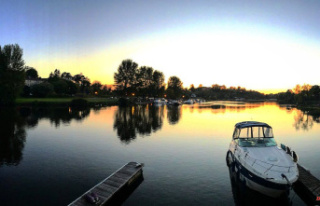Katrinka Cox lives American Dream with a green lawn, poolside view and $1.3m villa.
In her gated Florida community, she is the only black homeowner. Despite her financial success, she claims her attempts to purchase another property are being thwarted by her skin color.
Figures show that Black Americans are nearly twice as likely to lose a mortgage than their white counterparts.
Only 44% of black Americans have their own homes, while nearly 75% of whites do.
When confronted with data showing disparities, banks groups often denied discrimination, claiming that the statistics don't tell all.
Ms. Cox says she is aware of the reason why her mortgage application came to a halt.
"It's due to the colour of mine skin. She says she is an African-American woman.
She adds, "I know what my black peers have gone through getting loans." "And I know my white friends who couldn't afford loans, and how fast they were able to get them with no problems."
Ms. Cox is able to purchase the Miami property for $310,000 without needing a loan, but her application was not approved quickly.
She said that the bank asked her about her income and requested additional bank statements. They also demanded that she restart the process because of filing errors.
"I said, "What are you all doing?" "Why don't we try to close my loan?" They said they couldn't answer me," the 65-year old said.
Ms. Cox's experience is indicative of a nationwide pattern that, according to studies, is becoming worse. According to the National Community Reinvestment Coalition the gap in homeownership rates between black and white Americans is at its highest point in 120 years.
According to the US Census Bureau, only 44% of black Americans owned homes in March. This is down from nearly 50% in 2004. Interestingly, almost three quarters of all white families owned their home.
According to Zillow, which analyzes government data, 19.4% of black applicants were denied mortgages in 2021 compared to 10.8% for white applicants.
The Joint Center for Housing Studies at Harvard University found that mortgage holders who receive mortgages have higher interest rates and pay more than homeowners of lower incomes.
These lending obstacles have limited homeownership and contributed to a widening wealth gap between white Americans and black Americans. A typical white family has nearly 10 times as much wealth as a black household.
Teri Williams, chief operating officer at One United Bank, stated that homeownership can explain the vast difference in wealth between white and black people.
Ms Williams believes that the gap is not due to price increases alone.
She says, "There is systemic racism." "That's the bottom line."
American Bankers Association (ABA), denies racism behind lending decisions.
"ABA strongly believes that discrimination is out of place in the mortgage market. It is both morally unacceptable and a violation of federal or state law.
"A meaningful review of mortgage lending practices must consider individual factors like credit scores and credit histories," the group explained to BBC. This can help explain why seemingly similar applicants might not end up with the same outcome.
Zillow's economist Nicole Bachaud agrees that credit is the main reason why some applicants are denied mortgages, but says this is due to "systemic foundations" which affects more black people.
"Communities with color are less likely to be able to access credit because of historical outcomes such as redlining, which has prohibited access to credit. This has really left many communities of colour without formal financial institutions and access to banks or any other finance. They have been left out of the financial market completely.
These disparities have fueled calls for people moving their money to black-owned bank, with Killer Mike being one of the most prominent supporters of the Bank Black movement.
These calls gained momentum in 2016 due to outrage over the deaths by police of Alton Sterling and Philando Castile, both unarmed black men.
One United, America’s largest black-owned and black-run financial institution was the first to trademark the Bank Black term in that year.
The bank has provided more than $1bn worth of property loans to black families since then. After the 2020 murder of George Floyd, their customer count doubled to 100,000. This sparked protests across the globe and shined a light on the US's systemic racial disparities.
Jacqueline Wilcox, a first-time homeowner, and Wilbert, her husband were among them.
Although homeownership seemed impossible for many years, the low interest rates at One United allowed the couple to purchase their Miami home with two bedrooms, a sleek kitchen, and paved driveway. The living room was where they got married.
Ms Wilcox claims that black-owned banks give power back to black people, like herself, and help to convince the black community that they can buy.
The 56-year old says that it feels like we have been put in a box. Some of us feel so comfortable being renters because we've been there for so many years.
She feels that homeownership has given her a sense of financial security and freedom.
"You must have some type of foundation. You must leave a legacy. To be able to say I have lived, not just existed. She says that this is what it is for her.
"Homeownership places you in a new category." It's quite a different thing.












